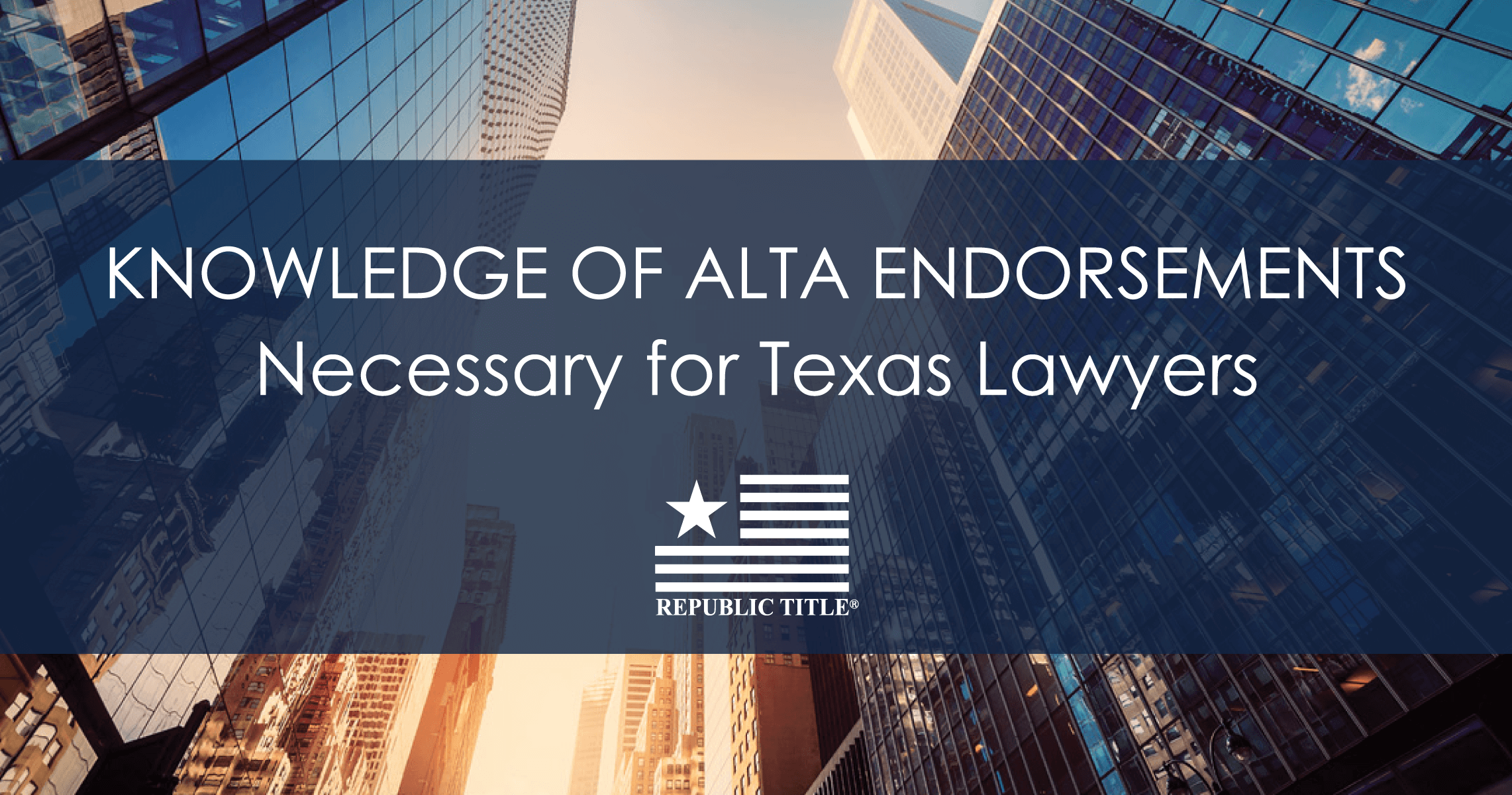
Attorney’s clients don’t just do business in Texas or even regionally anymore, it seems everyone is buying, selling and developing real estate all over the country. A Texas attorney may know the title insurance regulations and Basic Manual inside-out, but when they move to work in states that issue American Land Title Association (“ALTA”) forms, it can be a whole new ball game.
Texas attorneys know what types of coverage are available in Texas, but may get intimidated when looking at all of the coverages available in many ALTA states. There are 107 ALTA approved Endorsement forms, many with variations for specific transactions. Further, not all endorsements are available in every state issuing ALTA policies, so the task can be daunting.
The easiest way for a Texas attorney to understand many of the endorsements is to relate them to the coverages available in Texas, for example:
- Texas Access Endorsement (Form T-23) insures unimpeded vehicular and pedestrian access to a parcel of real estate. The ALTA 17-06 Access and Entry Endorsement provides basically the same coverage, but ALTA sometimes takes it further, they also have an ALTA 17.1-06 which insures vehicular and pedestrian access through an indirect manner (i.e. an insured easement estate), and a 17.2-06 which insures what utilities are available to the property. So, where Texas has 1 endorsement, there are 3 ALTA variations.
- The Texas Form T-19, Restrictions, Encroachments and Minerals Endorsement provides the same coverage on a Loan Policy as the ALTA 9-06 endorsement. However, where Texas can modify or delete language from the T-19 that the underwriter is not willing to provide, ALTA has additional endorsements that provide lesser coverage or modified coverage;
- Texas form T-19.1 Restrictions, Encroachments and Minerals provides similar coverage to the T-19 on an Owner Policy, but in ALTA, those coverages are all in separate endorsements, the Restrictions are covered in the ALTA 9.1 or 9.2, Encroachments in the ALTA 28 series of endorsements and Minerals in the ALTA 35 series of endorsements.
- Texas T-38 Endorsement is used when Mortgages are being modified, ALTA has 3 versions of a modification endorsement, the ALTA 11-06 insures against loss by reason of invalidity or enforceability as a result of the modification and priority over intervening matters, while the ALTA 11.1-06 provides the same coverage as the ALTA 11 but also includes a statement as to specific subordinate items and the ALTA 11.2-06 provides the same coverage as the ALTA 11 but also increases the amount of the policy arising out of the modification.
- Texas T-3 Assignment of Lien Endorsement insures the assignment document and down dates the policy to the recording of the assignment, the ALTA 10 insures the effectiveness of the assignment but does not down date the policy, while the ALTA 10.1 insures the effectiveness of the assignment and down dates the policy as to taxes, assessments, intervening defects, liens or encumbrances, recorded federal tax liens and bankruptcies.
However, ALTA has many more endorsements than Texas, and they get revised periodically, and several states modify the ALTA endorsements to comply with their state laws. It’s impossible to keep up on all of the ins and outs of ALTA coverages and endorsements, so it’s important to have good resources to tap as you represent your clients.
One of the best ways you can do that is to have a good relationship with a national title insurance company which handles closings all over the country and are very familiar with the idiosyncrasies of the available coverages in other states. Another great resource is a current ALTA Endorsement Manual. First American Title Insurance Company and many other underwriters publish them annually. You can access First American’s current manual through the Republic Title website. This guide will provide each endorsement form and give a brief explanation of its uses and the requirements for the issuance of each.
While the endorsement manual is very handy, attorneys need to understand that the forms can be modified in many states, either to comply with each state’s laws or to limit coverage as determined by their state title insurance associations or regulations. There are also states that don’t use the ALTA forms (i.e. Texas, Pennsylvania, New York to name a few) but have produced their own forms. In those instances, it’s great to have a National Underwriting Attorney or National Underwriter in your contacts that you can call to discuss the variations and availability in the state or region your client is working.
